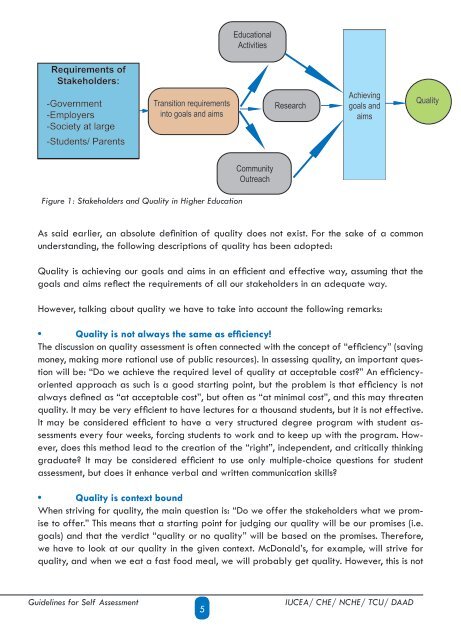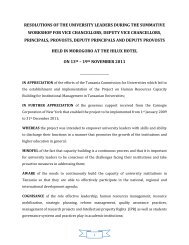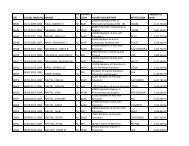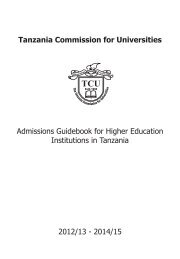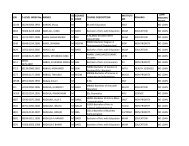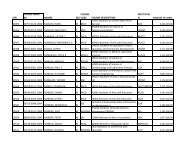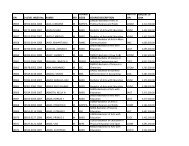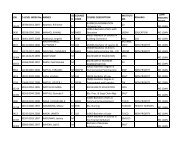Handbook for Quality Assurance in Higher Education The ... - TCU
Handbook for Quality Assurance in Higher Education The ... - TCU
Handbook for Quality Assurance in Higher Education The ... - TCU
You also want an ePaper? Increase the reach of your titles
YUMPU automatically turns print PDFs into web optimized ePapers that Google loves.
Requirements of<br />
Requirements Stakeholders: stakeholders:<br />
- -Government<br />
Government<br />
-Employers<br />
-Society at at large large<br />
-Students/ parents Parents<br />
As said earlier, an absolute def<strong>in</strong>ition of quality does not exist. For the sake of a common<br />
understand<strong>in</strong>g, the follow<strong>in</strong>g descriptions of quality has been adopted:<br />
<strong>Quality</strong> is achiev<strong>in</strong>g our goals and aims <strong>in</strong> an efficient and effective way, assum<strong>in</strong>g that the<br />
goals and aims reflect the requirements of all our stakeholders <strong>in</strong> an adequate way.<br />
However, talk<strong>in</strong>g about quality we have to take <strong>in</strong>to account the follow<strong>in</strong>g remarks:<br />
• <strong>Quality</strong> is not always the same as efficiency!<br />
<strong>The</strong> discussion on quality assessment is often connected with the concept of “efficiency” (sav<strong>in</strong>g<br />
money, mak<strong>in</strong>g more rational use of public resources). In assess<strong>in</strong>g quality, an important question<br />
will be: “Do we achieve the required level of quality at acceptable cost?” An efficiencyoriented<br />
approach as such is a good start<strong>in</strong>g po<strong>in</strong>t, but the problem is that efficiency is not<br />
always def<strong>in</strong>ed as “at acceptable cost”, but often as “at m<strong>in</strong>imal cost”, and this may threaten<br />
quality. It may be very efficient to have lectures <strong>for</strong> a thousand students, but it is not effective.<br />
It may be considered efficient to have a very structured degree program with student assessments<br />
every four weeks, <strong>for</strong>c<strong>in</strong>g students to work and to keep up with the program. However,<br />
does this method lead to the creation of the “right”, <strong>in</strong>dependent, and critically th<strong>in</strong>k<strong>in</strong>g<br />
graduate? It may be considered efficient to use only multiple-choice questions <strong>for</strong> student<br />
assessment, but does it enhance verbal and written communication skills?<br />
• <strong>Quality</strong> is context bound<br />
When striv<strong>in</strong>g <strong>for</strong> quality, the ma<strong>in</strong> question is: “Do we offer the stakeholders what we promise<br />
to offer.” This means that a start<strong>in</strong>g po<strong>in</strong>t <strong>for</strong> judg<strong>in</strong>g our quality will be our promises (i.e.<br />
goals) and that the verdict “quality or no quality” will be based on the promises. <strong>The</strong>re<strong>for</strong>e,<br />
we have to look at our quality <strong>in</strong> the given context. McDonald’s, <strong>for</strong> example, will strive <strong>for</strong><br />
quality, and when we eat a fast food meal, we will probably get quality. However, this is not<br />
Guidel<strong>in</strong>es <strong>for</strong> Self Assessment<br />
Transition requirements<br />
<strong>in</strong>to goals and aims<br />
Figure 1: Stakeholders and <strong>Quality</strong> <strong>in</strong> <strong>Higher</strong> <strong>Education</strong><br />
5<br />
<strong>Education</strong>al<br />
Activities<br />
Community<br />
Outreach<br />
Research<br />
Achiev<strong>in</strong>g<br />
goals and<br />
aims<br />
IUCEA/ CHE/ NCHE/ <strong>TCU</strong>/ DAAD<br />
<strong>Quality</strong>


